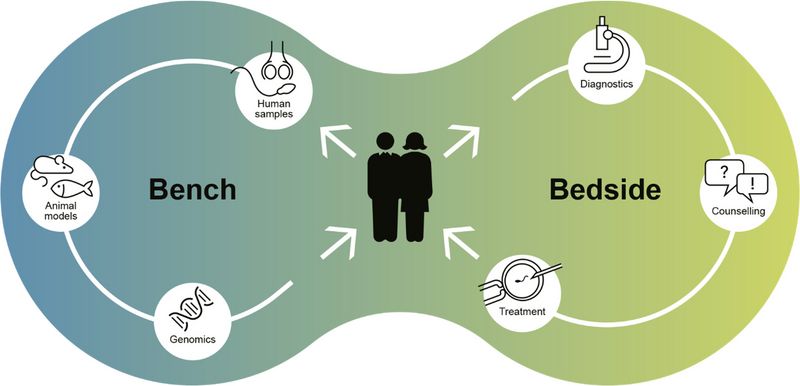URTC Reproductive Health

Spokesperson: Prof. Dr. med. Frank Tüttelmann (Centre of Medical Genetics, Department of Medical Genetics, Institute of Reproductive Genetics; Contact)
Spokesperson: Prof. Dr. rer. nat. Timo Strünker (Centre of Reproductive Medicine and Andrology; Contact)
Spokesperson: Prof. Dr. rer. nat. Nina Neuhaus (Centre of Reproductive Medicine and Andrology; Contact)
Description of the URTC
Infertility is a common multifactorial disease and comes into focus as a global health problem because, according to the WHO, it affects one in six people worldwide. The failure to naturally conceive a child is in equal shares due to male and female factors. Infertility can often be overcome by medically assisted reproduction (MAR), offering affected couples the chance for parenthood; in Germany, approximately 3 % of children are born via MAR, and numbers are continuously rising. However, the underlying causes for male, female, and couple infertility still remain mostly unknown, hampering both early diagnosis and personalised care. Hence, integrated research approaches investigating both the basic principles of reproduction and pathomechanisms of infertility are of pivotal medical, scientific, and public interest.
As a unique feature within the German academic landscape, Münster is renowned for multidisciplinary and translational reproductive research as well as the treatment of fertility disorders, with a particular focus on the male. Building on these achievements, we establish a University Research and Treatment Centres (URTC) Reproductive Health – composed of basic researchers and clinician scientists of the University (centred at the Medical Faculty, MFM), University Hospital (UKM), and Max Planck Institute (MPI) Münster as well as one collaborator from the RWTH Aachen.
The central objective of the URTC is to elucidate the genetic, molecular, and cellular mechanisms governing the formation and function of the testis, production and function of sperm, fertilisation process, embryonic development, implantation, and pregnancy – both in health and disease. The URTC also addresses oncological topics that are interlinked on the level of gonadal tumours, the growing intersection of infertility- and onco-genes, and oncological treatments that require measures for fertility preservation. To this end, we combine interdisciplinary research in molecular and cell biology, physiology, epi /genetics, evolution, (bio)informatics, and multimodal data analysis. The major focus is on humans, capitalising on the close interconnection of medicine, clinical science, and basic science established within the framework of previous and current collaborative research endeavours such as the DFG Clinical Research Unit "Male Germ Cells" (CRU326).
This unique setting enables projects relying on thoroughly characterised human material, particularly from patients suffering from infertility and related disorders, inspiring projects on selected mammalian and non-mammalian model organisms and vice versa. Our mission is to Spur the Translation of Basic Knowledge into the Clinic, to enable early diagnosis of infertility as well as co-morbidities, increase the fraction of evidence-based treatment decisions for medically assisted reproduction, and, thereby, improve the clinical care of infertile couples.

